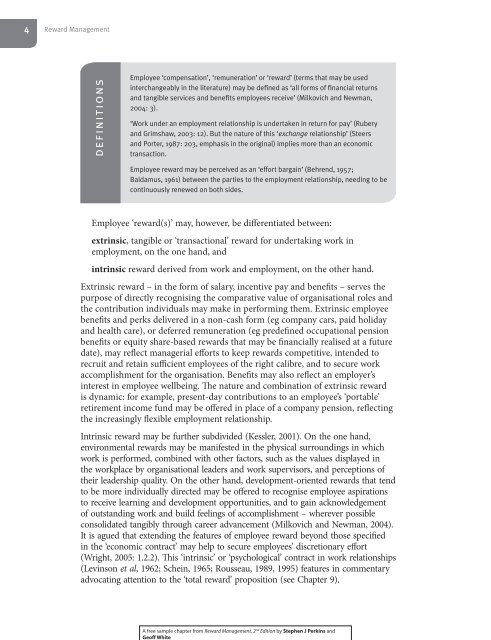Introducing the Reward Management System - CIPD
Introducing the Reward Management System - CIPD
Introducing the Reward Management System - CIPD
Create successful ePaper yourself
Turn your PDF publications into a flip-book with our unique Google optimized e-Paper software.
4<br />
<strong>Reward</strong> <strong>Management</strong><br />
definitions<br />
Employee ‘compensation’, ‘remuneration’ or ‘reward’ (terms that may be used<br />
interchangeably in <strong>the</strong> literature) may be defined as ‘all forms of financial returns<br />
and tangible services and benefits employees receive’ (Milkovich and Newman,<br />
2004: 3).<br />
‘Work under an employment relationship is undertaken in return for pay’ (Rubery<br />
and Grimshaw, 2003: 12). But <strong>the</strong> nature of this ‘exchange relationship’ (Steers<br />
and Porter, 1987: 203, emphasis in <strong>the</strong> original) implies more than an economic<br />
transaction.<br />
Employee reward may be perceived as an ‘effort bargain’ (Behrend, 1957;<br />
Baldamus, 1961) between <strong>the</strong> parties to <strong>the</strong> employment relationship, needing to be<br />
continuously renewed on both sides.<br />
Employee ‘reward(s)’ may, however, be differentiated between:<br />
extrinsic, tangible or ‘transactional’ reward for undertaking work in<br />
employment, on <strong>the</strong> one hand, and<br />
intrinsic reward derived from work and employment, on <strong>the</strong> o<strong>the</strong>r hand.<br />
Extrinsic reward – in <strong>the</strong> form of salary, incentive pay and benefits – serves <strong>the</strong><br />
purpose of directly recognising <strong>the</strong> comparative value of organisational roles and<br />
<strong>the</strong> contribution individuals may make in performing <strong>the</strong>m. Extrinsic employee<br />
benefits and perks delivered in a non-cash form (eg company cars, paid holiday<br />
and health care), or deferred remuneration (eg predefined occupational pension<br />
benefits or equity share-based rewards that may be financially realised at a future<br />
date), may reflect managerial efforts to keep rewards competitive, intended to<br />
recruit and retain sufficient employees of <strong>the</strong> right calibre, and to secure work<br />
accomplishment for <strong>the</strong> organisation. Benefits may also reflect an employer’s<br />
interest in employee wellbeing. The nature and combination of extrinsic reward<br />
is dynamic: for example, present-day contributions to an employee’s ‘portable’<br />
retirement income fund may be offered in place of a company pension, reflecting<br />
<strong>the</strong> increasingly flexible employment relationship.<br />
Intrinsic reward may be fur<strong>the</strong>r subdivided (Kessler, 2001). On <strong>the</strong> one hand,<br />
environmental rewards may be manifested in <strong>the</strong> physical surroundings in which<br />
work is performed, combined with o<strong>the</strong>r factors, such as <strong>the</strong> values displayed in<br />
<strong>the</strong> workplace by organisational leaders and work supervisors, and perceptions of<br />
<strong>the</strong>ir leadership quality. On <strong>the</strong> o<strong>the</strong>r hand, development-oriented rewards that tend<br />
to be more individually directed may be offered to recognise employee aspirations<br />
to receive learning and development opportunities, and to gain acknowledgement<br />
of outstanding work and build feelings of accomplishment – wherever possible<br />
consolidated tangibly through career advancement (Milkovich and Newman, 2004).<br />
It is agued that extending <strong>the</strong> features of employee reward beyond those specified<br />
in <strong>the</strong> ‘economic contract’ may help to secure employees’ discretionary effort<br />
(Wright, 2005: 1.2.2). This ‘intrinsic’ or ‘psychological’ contract in work relationships<br />
(Levinson et al, 1962; Schein, 1965; Rousseau, 1989, 1995) features in commentary<br />
advocating attention to <strong>the</strong> ‘total reward’ proposition (see Chapter 9).<br />
A free sample chapter from <strong>Reward</strong> <strong>Management</strong>, 2 nd Edition by Stephen J Perkins and<br />
Geoff White<br />
Published by <strong>the</strong> <strong>CIPD</strong>.<br />
Copyright © <strong>CIPD</strong> 2011<br />
All rights reserved; no part of this excerpt may be reproduced, stored in a retrieval system,<br />
or transmitted in any form or by any means, electronic, mechanical, photocopying, recording,<br />
or o<strong>the</strong>rwise without <strong>the</strong> prior written permission of <strong>the</strong> Publishers or a licence permitting<br />
restricted copying in <strong>the</strong> United Kingdom issued by <strong>the</strong> Copyright Licensing Agency.<br />
If you would like to purchase this book please visit www.cipd.co.uk/bookstore.

















